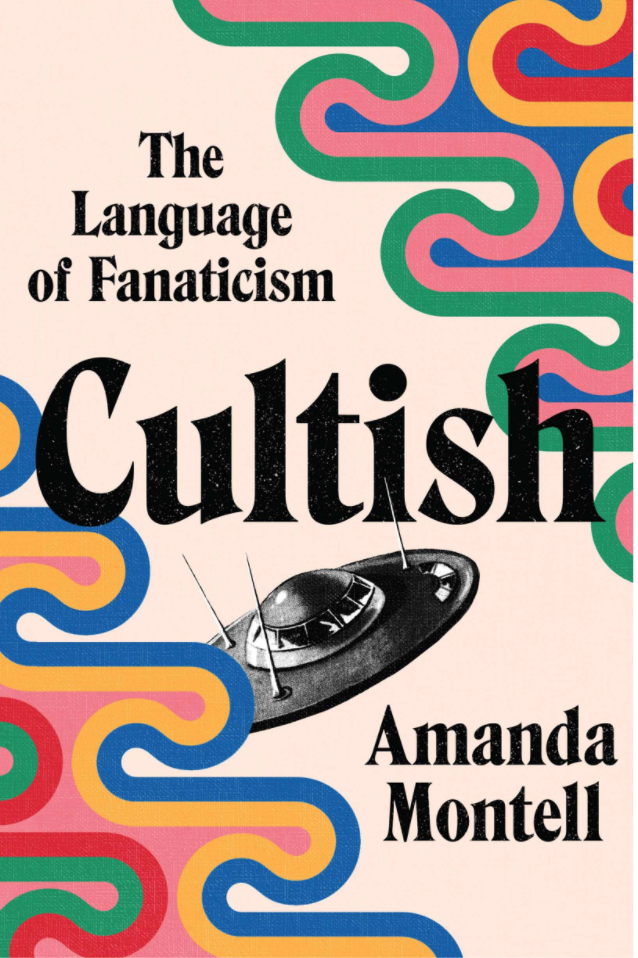Cultish by Amanda Montell is out now in hardback, ebook and audiobook.
Listen to Sounds Like A Cult here
FURTHER READING
The New Yorker: What Makes A Cult
CULTISH
AMANDA MONTELL
Publisher: Harper Collins
Imprint: Harper Wave
Genre: Non-fiction, Linguistics
Slick, witty and wordy, Cultish will have you in constant criticism of your prose. Religiously checking you aren’t slipping into multi-level marketing scripts or faux-woke fanatic language.
Author Amanda Montell offers us a well-researched and well written study on the language of fanaticism. Cultish is an encyclopedic commentary on how our silly little pea brains are predisposed to create culture and community with language. Montell references cult groups from Jonestown and Scientology to SoulCycle and MLM Marketing. Her argument - that language is the ultimate form of power.
A lethal dose of cyanide placed into a sweet cordial Flavor Aid, often incorrectly referred to as Kool Aid was consumed by hundreds of members of the cult the People’s Temple. Synonymously known as the Jonestown Massacre, this event is one of the the largest mass deaths in American history. Over 900 people died. Born from this event is the phrase drinking the kool-aid. A term used when someone is feeding into a popular, cult-like obsession.
‘I went to SoulCycle six times last week, guess I’m just drinking the kool-aid .’
We use this term casually, when its origins are of harrowing death and catastrophe. As a stand alone point, Jonestown encapsulates a weathered example of fanatic language and the dissolution of language in the same breath. Whether you adhere to descriptivist or prescriptivist ideals, words and their meanings change. Should we do better as a society to respect their origins?
The applications of this concept are broad and as you can see Cultish proves an excellent prompt for the analysis of language.
Ironically, brilliant prose is used throughout Cultish in order to expose the power of its own devices, persuasive language. As a reader I found myself constantly referencing my personal persuasive style and how it may lean into, at the very least, a manipulation of those around me.
In an attempt to communicate, am I accidentally mimicking a cult leader?
Reading Cultish, it’s easy to find examples of cult-like language all around you. Even now as I sit in my decades old reading chair, a rogue spring dutifully poking my back, I have the Netflix series Cheer humming through my TV. Cheerleading, its own insular community, its own foreign language. Back tuck, back handspring back tuck. FIOFMU? These conjunctions of letters may as well be gibberish to the average English speaker, but these teens have built a community in the brutally earnest way only college kids can seem to achieve. There is passion and dedication to this outrageous sport. They commit hours, their bodies, their emotions and their lives. Without question this is an all-encompassing ‘sport.’
Is cheerleading a cult? Colloquially, yes - it is. Is cheerleading inherently bad? Hopefully not.
This is the conclusion Montell is guiding us to throughout her chapters. Rather than the concept ‘cults use cultish language and cults are bad’ we are asked to draw the conclusion ‘we all use language, understand its power.’
Cultish reads similarly to a case study, there are many examples to support Montell’s point, some stronger than others, despite this variation it’s well worth a read. From a fiction based reader, this nonfiction was a refreshing vacay into an unsightly concept. Insightful and well referenced, if you too are strangely fascinated with extreme human behaviours, pick up Cultish here.
For further cultish content, Montell also co-hosts a podcast ‘Sounds Like A Cult’ - listen here.



